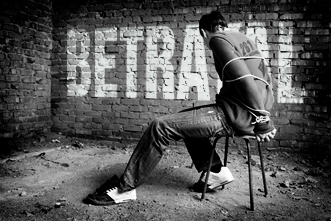Being stabbed in the back isn’t fun. All of a sudden everything you thought was true about your relationship with someone gets turned upside down. It’s painful part of leadership and unfortunately it comes with the territory.
Like most of us, I’ve been betrayed. And when it happened it hurt…badly. Some of these instances were brutal, heartless, repeated stabs in the back. I’ll spare you the details but needless to say it was a gory mess that left me discouraged and angry.
Often my response after something like this happens can be boiled down to this philosophy…MIKE, YOU MUST NOW PROTECT YOURSELF.
In Cannon’s “fight-or-flight” response theory, humans experience a primitive, automatic, inborn response that prepares the body to “fight” or “flee” from any attack, harm or threat to their survival. My response would be more like “flee,” “shut down,” and “barricade” as I began to run every thought, move, decision, and relationship through the filter of having been deceived.
It made logical sense to protect myself. To hold back something in my relationships. To hedge. To minimize risk. To dream smaller. To put the odds in my favor so that I would never have to go through that pain again.
I justified it perfectly in my mind. I said things like, “I’ve got to protect my family, the organizations that I represent, and my future. I can’t emotionally, spiritually, and financially take another blow like this. I’ll be all the more safer the next time someone tries to pull a fast one on me.”
But here’s the irony: it wasn’t the betrayal that ruined my life. It was the protective mode I put in place to deal with my wounds.
I stopped living. I became a hostage to my hurt instead of learning from it. I began operating out of fear and doubt instead of strength and confidence. I realized the life I was functioning under was merely a cheap version of what I was truly created for.
Here are a few truths to consider the next time you’re betrayed. They are reminders that you are created for much more than self-preservation; you are designed for moments that challenge your character to trump your circumstances.
YOU’RE NOT A FAILURE
It’s easy to throw the world’s wildest pity party and get drunk off our insecure ego when we’ve been betrayed. It hits this deep urge inside us to blame someone for the injustice we feel. The blame usually starts by looking outward at our betrayer but then slowly gravitates towards our own self. We feel responsible, ashamed, naïve, and incapable. These feelings are corrosive. False. Phony. Meaningless. Unproductive.
They have no substance in a life marked by radical grace. Think about it logically. Rarely does someone set out to be betrayed. Bernie Madoff didn’t go after suckers. The president of NYU and Larry King didn’t wake up one morning and decide to put their trust in something that didn’t seem like a good investment deal at the time. Sometimes, we simply can’t help being stabbed in the back. We can exhaust ourselves with walls and cages, with scrutiny, and paranoia, but ultimately the culpability lies in the hands of the betrayer.
YOU HAVE A CHOICE
While we may not be able to help being betrayed, we CAN help how we react to betrayal. While it’s unproductive to keep blaming ourselves, we also don’t want to turn into “that guy” who makes every conversation a three-act-monologue about how he’s been wronged. Nobody likes to be around that guy. Not your wife. Not your co-workers. Not your grandma. All of us have the capacity to choose how we respond to the situations life throws our way. We can let them control us or we can view them as opportunities to develop our character and confidence, putting fingers and toes to the concept of radical grace. We can clam up and shut down or we can learn to trust again.
GRACE WORKS
I get it. The last thing we want to do when we’ve been betrayed is forgive. It’s like getting into a tragic car accident and going for a drive the very next day. I get that the concept of grace is messy, risky, unusual, and unpracticed, but I honestly believe it’s exactly what we’re designed for. There’s something miraculous that happens when we let go of what’s been controlling us, when we release our anger and disappointment and grab hold of freedom uninhibited by judgment. Forgiving is such an important part of being whole and healthy.
It is also important to differentiate between trust and grace. Building trust again in the individual may take some time and perhaps in some cases may never happen. Should the thousands of people who gave Bernie Madoff their hard earned money now give him more to invest? Probably not. Trust isn’t necessarily the immediate goal after a betrayal. In my experience, trust often takes more time than forgiveness and in many leadership cases may be unwise to move too quickly. But this should never stand in the way of forgiving someone who has wronged you.
I’m figuring out how to do that in my own life. My hope for you is that you will join me.












